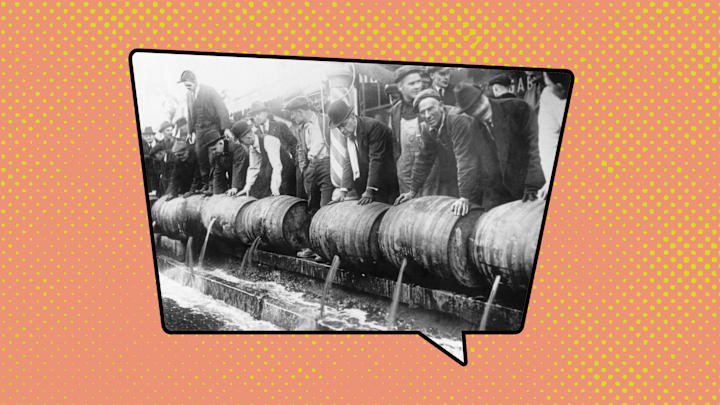In January 1920, the Eighteenth Amendment to the U.S. Constitution went into effect, prohibiting the “manufacture, sale, or transportation of intoxicating liquors” and kicking off a period known as Prohibition. With it came language to describe everything from drinking establishments to the people who made booze to booze itself. The Twenty-First Amendment ended Prohibition on December 5, 1933, but the colorful colloquialisms it popularized will live on forever. Here are just a handful of them.
1. Blind Pig
An illegal drinking establishment, a.k.a. a speakeasy, that attempted to evade police detection by charging patrons a fee to gaze upon some sort of exotic creature (i.e., a blind pig) and be given a complimentary cocktail upon entrance. Also known as a blind tiger. According to Merriam-Webster, both phrases were used pre-Prohibition, dating back to 1886 and 1857, respectively.
2. Juice Joint

Initially a term for a soft drink stand, according to the Oxford English Dictionary (OED), this term dates back to 1927 and came to be used to refer to “a bar, club, or stall serving either alcoholic or non-alcoholic liquor.” It became a term for a speakeasy in the 1930s.
3. Jake Walk
A jake walk is paralysis or loss of muscle control in the leg due to an overconsumption of Jamaican ginger, a.k.a. Jake, a legal substance with an alcoholic base. The numbness led sufferers to walk with a distinct gait that was also known as Jake leg or Jake foot.
4. Ombibulous

A term made up by writer H.L. Mencken in 1920 to describe his love of alcohol; he noted, “I'm ombibulous. I drink every known alcoholic drink and enjoy them all.” Mencken was also fond of referring to bootleggers as booticians.
5. Needle Beer
If a Prohibition-era saloonkeeper had alcohol-free/low-alcohol beer, a jar of alcohol, and a needle, they could make needle beer by pushing a syringe of alcohol through the cork in the barrel and injecting it into the beer. It was very dangerous, though.
6. Brick of Wine
Oenophiles looking to get their vino fix could do so by simply adding water to a dehydrated block of juice. After storing it for a few weeks, it would become wine. (And you thought a box of wine was bad!)
7. Bathtub Gin

A homemade—and often poorly made—gin. It was often made in a bottle so tall that it could not be mixed with water from a sink tap and was mixed in a bathtub instead. Though the phrase references gin specifically, it came to be used as a general term for any type of cheap homemade booze.
8. White Lightning
According to Detroit Beer: A History of Brewing in the Motor City, “white lightning was the whiskey equivalent of bathtub gin. Both were highly potent, illegally made, and poor-quality spirits.”
9. Teetotaler
A person who abstains from the consumption of alcohol. According to Merriam-Webster, “In the early 1800s, tee-total and tee-totally were used to intensify total and totally ... Teetotal and teetotaler first appeared with their current meanings in 1834, eight years after the formation of the American Temperance Society.” And the tee here isn’t related to the beverage; as Merriam-Webster notes, it’s “a reduplication of the letter t that begins total, emphasizing that one has pledged total abstinence.”
10. Dry
A noun used in reference to a person who is opposed to the legal sale of alcoholic beverages. Bureau of Prohibition agents were often referred to as dry agents (though corruption among this crew ran rampant). As an adjective, it describes a place where alcohol is not served.
11. Wet

The opposite of dry, a wet is a person who is for the legal sale of alcoholic beverages or a place where liquor is in full supply.
12. Whale
A heavy drinker.
13. Blotto
Extremely drunk, often to the point of unconsciousness. According to the OED, this term originated in 1917.
14. Hooch
Hooch refers to low-quality liquor, usually whiskey. The term originated in the late 1800s as a shortened version of “Hoochinoo,” a distilled beverage from Alaska that became popular during the Klondike gold rush. The phrase came back into heavy use in the 1920s.
15. Giggle water

This term for champagne originated in 1910. Later, it referred more generally to alcoholic beverages, especially one made of whiskey or gin.
A version of this story ran in 2018; it has been updated for 2023.
